
Minerals
Scope & Guideline
Driving insights and advancements in geotechnical engineering.
Introduction
Aims and Scopes
- Mineral Processing and Recovery Techniques:
Research on novel methods for the extraction, processing, and recovery of minerals, including innovative flotation techniques, hydrometallurgical processes, and biotechnological approaches. - Geochemical and Mineralogical Studies:
Studies focused on the geochemistry of minerals, including their formation, alteration, and the environmental impacts of mining activities. - Petrogenesis and Tectonic Context:
Investigations into the origin and evolution of rocks, particularly granitic and volcanic formations, with implications for tectonic processes and mineralization. - Environmental and Ecological Impact Assessments:
Research addressing the ecological consequences of mining and mineral processing, including contamination assessments and sustainable practices. - Advanced Characterization Techniques:
Application of cutting-edge analytical methods, such as LA-ICP-MS, XRD, and spectroscopy, to characterize mineral properties and behaviors. - Nanotechnology and Innovative Materials:
Exploration of the use of nanoscale materials and technologies in mineral applications, including their roles in catalysis, remediation, and material science.
Trending and Emerging
- Sustainable Mining Practices:
Research increasingly emphasizes sustainable mining, including waste recycling, eco-friendly extraction methods, and the reduction of environmental impacts from mining activities. - Critical and Rare Metals:
There is a growing focus on the exploration, extraction, and recovery of critical and rare metals, driven by their importance in technology and renewable energy applications. - Machine Learning and Data Analytics in Geosciences:
The application of machine learning and advanced data analytics is on the rise, enhancing mineral exploration, resource estimation, and process optimization. - Biogeochemistry and Microbial Interactions:
Emerging studies explore the role of microorganisms in mineral processing, bioleaching, and the biogeochemical cycles of metals, highlighting innovative approaches to resource recovery. - Mineral-Based Materials for Environmental Applications:
Research on the use of minerals in environmental remediation and sustainability, including the development of new materials for water treatment and carbon capture.
Declining or Waning
- Traditional Mineralogy:
Research focused solely on classical mineralogy without integration of modern analytical techniques or interdisciplinary approaches appears to be waning. - Conventional Mining Techniques:
Studies centered on traditional mining methods are becoming less frequent as the emphasis shifts towards sustainable and environmentally friendly practices. - Single-Mineral Studies:
Research focusing exclusively on individual minerals, without context to broader geological or environmental systems, is being overshadowed by more integrative studies. - Historical Mining Practices:
There is a noticeable decline in research solely dedicated to historical mining practices, as contemporary issues and sustainable practices take precedence. - Geotechnical Engineering without Mineral Context:
Research in geotechnical engineering that does not incorporate mineralogical insights or impacts is becoming less relevant in the journal's scope.
Similar Journals
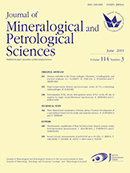
Journal of Mineralogical and Petrological Sciences
Fostering Scholarly Excellence in Mineralogical StudiesThe Journal of Mineralogical and Petrological Sciences, published by the Japan Association of Mineralogical Sciences, serves as a vital platform for disseminating high-quality research in the fields of mineralogy and petrology. With a presence in both traditional and digital formats (ISSN: 1345-6296; E-ISSN: 1349-3825), this journal fosters scholarly engagement and innovation within these crucial branches of Earth Sciences. As evidenced by its Q3 ranking in both Geology and Geophysics categories for 2023, Journal of Mineralogical and Petrological Sciences maintains a significant standing within the academic community, contributing to the ongoing discourse and exploration of mineralogical phenomena and processes. Researchers, professionals, and students alike will find valuable insights and advancements represented within its pages, with a commitment to inclusivity in research output spanning two decades (2000-2024). Although not currently open access, the journal remains a key resource for understanding the complexities of our geological world.

Kompleksnoe Ispolzovanie Mineralnogo Syra
Pioneering Research for a Greener Mineral IndustryKompleksnoe Ispolzovanie Mineralnogo Syra is a prominent journal dedicated to the comprehensive exploration and utilization of mineral resources, contributing significantly to the fields of metallurgy and ore beneficiation. Published by the esteemed INST METALLURGY & ORE BENEFICIATION based in Almaty, Kazakhstan, this journal serves as a critical platform for researchers and practitioners seeking to advance knowledge in mineral processing and sustainable extraction methods. Although specific impact factors and H-Index data are currently unavailable, its rigorous peer-review process ensures high-quality research dissemination. The journal welcomes original research articles, reviews, and case studies that meet the scientific community's needs, all aimed at enhancing the efficiency and sustainability of mineral resource use. As an open-access publication, it strives to make significant advancements in the field accessible to a wider audience, fostering innovation and collaboration among professionals, researchers, and students alike.
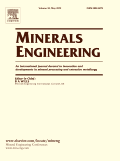
MINERALS ENGINEERING
Empowering the Future of Engineering Through ResearchMINERALS ENGINEERING, an esteemed journal published by PERGAMON-ELSEVIER SCIENCE LTD, is at the forefront of disseminating cutting-edge research in the fields of minerals processing, geotechnical engineering, and control systems. Since its inception in 1988, this journal has become a pivotal platform for researchers, professionals, and students alike, offering insights and advancements that contribute significantly to both academia and industry. With a strong emphasis on interdisciplinary approaches, MINERALS ENGINEERING is ranked in the top quartile (Q1) for multiple engineering categories, including Mechanical Engineering and Geotechnical Engineering, highlighting its relevance and influence in the global scientific community. Although not an open access journal, it provides comprehensive analyses and robust methodologies that are critical for advancing technological innovations and environmental sustainability within engineering. Researchers can rely on this journal to stay informed about the latest developments, trends, and challenges they face in the field, ensuring they are at the forefront of minerals engineering research.

Canadian Journal of Mineralogy and Petrology
Advancing Knowledge: Your Gateway to Mineralogy and Petrology ResearchThe Canadian Journal of Mineralogy and Petrology, published by the Mineralogical Association of Canada, is a pioneering platform dedicated to the dissemination of high-quality research in the realms of mineralogy, petrology, and geochemistry. With an increasing focus on global geological challenges, the journal serves as a crucial resource for researchers, professionals, and students alike, offering peer-reviewed articles that reflect the latest advancements in these fields. Although specific metrics such as the impact factor and H-Index are not currently available, the journal is committed to fostering valuable discourse and innovation, thereby enhancing our understanding of Earth's materials. The journal operates under an Open Access model, ensuring that its findings are widely accessible, thus promoting collaborative research and education. Situated in Quebec, Canada, the journal plays a vital role in connecting the international research community with local expertise and discoveries, making it an essential read for anyone involved in mineralogical sciences.

Physicochemical Problems of Mineral Processing
Enhancing Understanding of Physicochemical Challenges in MineralsPhysicochemical Problems of Mineral Processing is a prestigious journal that serves as a vital resource in the fields of Economic Geology, Geology, Materials Chemistry, Physical and Theoretical Chemistry, and Process Chemistry and Technology. Published by OFICYNA WYDAWNICZA POLITECHNIKI WROCLAWSKIEJ in Poland, this journal has been a cornerstone of interdisciplinary research since its inception in 2008, with a commitment to advancing our understanding of mineral processing through innovative physicochemical methodologies. With a respectable Q3 category ranking across multiple disciplines and Scopus rankings that reflect its growing impact and relevance, the journal invites researchers, professionals, and students to explore cutting-edge studies, original articles, and case reports aimed at enhancing the mineral processing field. While the journal does not offer open access, it provides valuable insights and contributions to the global academic community, making it essential reading for those looking to push the boundaries of knowledge in this critical area.
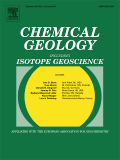
CHEMICAL GEOLOGY
Exploring the Depths of Earth’s Chemical ProcessesChemical Geology is an esteemed international journal published by Elsevier, dedicated to the rigorous exploration of geochemistry and petrology, with its foundational roots tracing back to 1966. As evidenced by its impressive Q1 ranking in both Geochemistry and Petrology as well as Geology in the 2023 category quartiles, this journal stands as a premier outlet for cutting-edge research and innovative methodologies within these vital fields. With a Scopus rank placing it in the top 10% of Earth and Planetary Sciences, Chemical Geology offers a platform for researchers, professionals, and students alike to disseminate findings that advance our understanding of geological processes and materials. Although it does not currently offer open-access options, the journal remains committed to high-quality publications that contribute significantly to the scholarly community. Located in the vibrant academic milieu of Amsterdam, Netherlands, Chemical Geology is an essential resource for those engaged in the earth sciences, aiming to bridge theoretical insights with practical applications.

International Journal of Minerals Metallurgy and Materials
Shaping the Future of Metallurgy and MaterialsThe International Journal of Minerals Metallurgy and Materials, published by SPRINGER, stands as a prominent forum in the fields of minerals, metallurgy, and materials science. With an ISSN of 1674-4799 and an E-ISSN of 1869-103X, this journal has been disseminating high-quality research since its inception in 2009 and will continue to publish until 2024. Based in China, this journal supports Open Access options, maximizing the reach and impact of scholarly work. Enhanced by its impressive Scopus rankings, it holds a Q2 position in Geochemistry and Petrology and a Q1 ranking in Materials Chemistry, Mechanical Engineering, Mechanics of Materials, and Metals and Alloys for 2023. Such accolades reflect its continual commitment to advancing knowledge in these disciplines, making it essential reading for researchers, professionals, and students aiming to stay abreast of contemporary developments and innovative solutions in materials science.
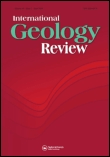
INTERNATIONAL GEOLOGY REVIEW
Fostering a deeper understanding of Earth's processes and materials.INTERNATIONAL GEOLOGY REVIEW, published by Taylor & Francis Inc, is a premier journal dedicated to advancing the field of geology since its inception in 1959. With its Q1 ranking in the field of Geology for 2023, this journal is a significant platform for researchers, professionals, and students exploring the intricacies of Earth and planetary sciences. The journal has been rated in the 81st percentile within Scopus rankings, reflecting its influence and the high quality of articles published. Although it does not offer Open Access options, the journal maintains a rigorous peer-review process to ensure the publication of original and impactful research. With an extensive archive projected to continue until 2024, INTERNATIONAL GEOLOGY REVIEW serves as an essential resource for those seeking to deepen their understanding of geological phenomena, making it a vital contributor to the global scientific community.

Mining of Mineral Deposits
Elevating Standards in Mining EngineeringMining of Mineral Deposits, published by the NATIONAL MINING UNIVERSITY in Ukraine, stands as a pivotal journal in the fields of engineering and earth sciences, evidenced by its commendable rankings across various categories, including a Q1 classification in Engineering (miscellaneous) and notable placements in Geochemistry and Geotechnical Engineering (Q2) for 2023. With an ISSN of 2415-3435 and E-ISSN 2415-3443, this journal provides a dedicated platform for researchers, professionals, and students alike to disseminate significant findings pertaining to mineral deposits and mining technologies. The journal has evolved over the years, bridging vital research gaps since its inception in 2016, and aims to enhance knowledge and collaboration within the mining community. Although it operates under limited access options, its rigorous peer-review process ensures that only high-quality research is published, all contributing to its respectable impact factor and visibility in the academic landscape. Located in Dnipropetrovsk, this journal not only serves as a repository of knowledge but also promotes advancements in sustainable mining practices and resource management, making it an essential resource for those engaged in mineral exploration and extraction.
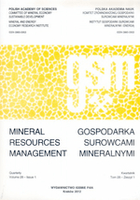
Gospodarka Surowcami Mineralnymi-Mineral Resources Management
Uncovering Insights for Sustainable Resource PracticesGospodarka Surowcami Mineralnymi-Mineral Resources Management is a pivotal academic journal published by the Polish Academy of Sciences and the Mineral and Energy Economics Research Institute. Focusing on the field of Economic Geology, this journal plays a critical role in disseminating research on mineral resources management, exploring the economic implications of mineral exploitation, sustainability practices, and technological advancements in resource extraction. With an ISSN of 0860-0953 and an E-ISSN of 2299-2324, the journal has established itself as a respected source of knowledge, holding a Q3 ranking in its category as of 2023 and demonstrating its relevance within a competitive landscape where it ranks 22nd out of 43 in Economic Geology according to Scopus. Researchers, professionals, and students will find this journal to be an invaluable resource for the latest insights and developments in mineral resource management, contributing significantly to the overarching conversations in geology and environmental science.